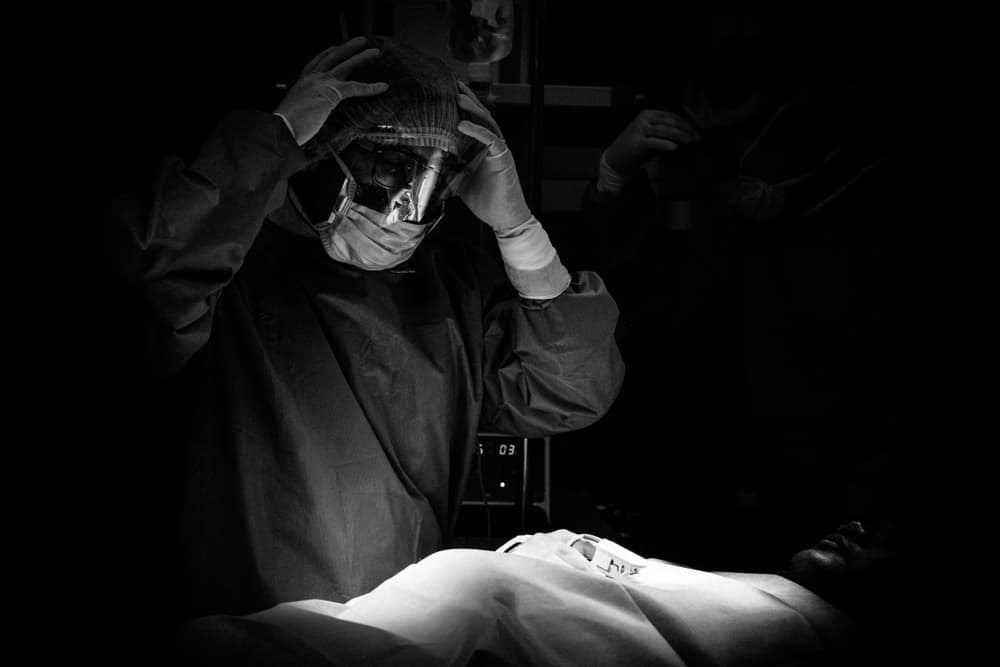What Are the Common Causes of Surgical Errors?
Gregg Hollander | July 5, 2024 | Medical Malpractice

Surgical errors frequently result from medical negligence or malpractice by a treating healthcare provider. You may recover compensation if you or someone you love suffered a medical complication due to a surgical error. First, contact a knowledgeable medical malpractice lawyer in your area immediately.
Your attorney can gather the relevant medical documentation, determine your legal options, and handle every step of the medical malpractice case for you. Your lawyer can also represent you during settlement negotiations – and at legal proceedings in the court system – to achieve the best possible result for you.
Types of Surgical Errors and How They Occur
Surgical errors, unfortunately, remain a challenging aspect of healthcare despite stringent protocols and advanced technologies.
Some of the most common types of surgical errors include:
- Wrong-site Surgery – This occurs when a surgeon operates on the wrong part of the body. It may involve operating on the wrong side, organ, or even the wrong patient. Factors contributing to this error include inadequate pre-operative verification processes, miscommunication among surgical team members, and failure to mark the surgical site properly.
- Surgical Instruments Left Inside the Patient – Surgeons sometimes inadvertently leave surgical instruments or other foreign objects inside a patient’s body. This error can lead to serious complications such as infections, organ damage, and prolonged hospital stays. It often happens due to oversight during the instrument-counting process before and after the surgery.
- Anesthesia Errors – Anesthesia is crucial for keeping patients pain-free during surgery, but errors in administering it can have severe consequences. These errors include administering too much or too little anesthesia, improper monitoring during surgery, and failing to account for a patient’s medical history or allergies.
- Nerve Damage – During surgery, nerves can accidentally get damaged, leading to complications such as numbness, weakness, or chronic pain. Surgeons must exercise extreme caution to avoid injuring nearby nerves while performing procedures – especially in delicate body areas.
- Post-operative Complications – Sometimes, surgical errors manifest after the operation or during the recovery period. These complications can include bleeding, blood clots, pneumonia, or organ failure. Factors contributing to post-operative complications may include inadequate monitoring, poor follow-up care, or underlying health issues.
These errors often stem from human error, miscommunication, fatigue, inadequate training, and systemic issues within healthcare institutions. Surgeons and their teams are under immense pressure to perform flawlessly, often in high-stress environments requiring split-second decisions. However, mistakes can still occur even with the best intentions and precautions.
If you are the victim of a surgical error, a skilled medical malpractice lawyer can determine your legal options and aggressively advocate for your rights and interests.
Types of Medical Complications that Can Arise from a Surgical Error
Surgical errors may lead to various medical complications, highlighting the importance of precision and vigilance in the operating room.
Some of the most frequent complications that result from surgical errors include:
- Infection – One of the most common complications following surgical errors is infection. Improper sterilization of equipment, poor wound care, or unsanitary conditions in the operating room can introduce bacteria, leading to infections at the surgical site. These infections may cause pain, swelling, redness, and in severe cases, systemic illness requiring additional treatment.
- Internal Bleeding – Surgical errors may inadvertently damage blood vessels, leading to internal bleeding. Symptoms of internal bleeding include dizziness, abdominal pain, and a rapid heartbeat. Without prompt intervention, excessive bleeding can lead to shock or organ damage.
- Organ Damage – During surgery, organs adjacent to the surgical site may sustain unintended damage. This can occur due to surgical instruments slipping or improper technique. Organ damage can result in complications such as decreased organ function, infection, or the need for additional surgeries to repair the damage.
- Nerve Damage – Surgical procedures near nerves can sometimes result in nerve damage. This can cause numbness, tingling, weakness, or chronic pain in the affected area. Nerve damage can significantly affect a patient’s quality of life and may require long-term management or rehabilitation.
- Blood Clots – Prolonged immobility during surgery or inadequate post-operative care can increase the risk of blood clot formation, known as deep vein thrombosis (DVT). If a blood clot dislodges and travels to the lungs, it can cause a life-threatening condition called pulmonary embolism. Symptoms of DVT include swelling, pain, and redness in the affected limb, while symptoms of pulmonary embolism include chest pain, difficulty breathing, and coughing up blood.
- Anesthesia Complications – Errors in anesthesia administration can lead to complications such as allergic reactions, respiratory problems, or adverse drug interactions. Anesthesia-related complications require immediate attention to ensure patient safety and prevent further harm.
If you are the victim of a surgical error, an experienced medical malpractice lawyer can handle the legal components of your case while you recover from your medical complication(s).
How Do You Prove a Surgical Error?

Proving a surgical error in a legal context can be a complex and challenging endeavor. It requires thorough documentation, expert testimony, and a clear demonstration of negligence or malpractice.
Injured patients must gather compelling evidence to support their claims and establish a causal link between the surgical error and the resulting harm.
- Medical Records – Medical records are foundational evidence in proving a surgical error. These records include pre-operative assessments, surgical notes, anesthesia records, post-operative care instructions, and any subsequent medical treatments. Discrepancies or inconsistencies in these records can signal potential errors or deviations from the standard of care.
- Expert Testimony – Expert testimony from qualified medical professionals is often essential in proving a surgical error. Surgeons, anesthesiologists, nurses, or other specialists can provide insight into whether the surgeon adhered to accepted medical practices during the procedure. Expert witnesses can analyze medical records, evaluate the patient’s condition, and offer opinions on whether negligence or malpractice likely occurred.
- Witness Statements – Witness statements from individuals present during the surgery or involved in the patient’s care can provide valuable perspectives on what transpired. Nurses, surgical assistants, or other healthcare professionals may have observed deviations from standard procedures or communication breakdowns contributing to the error.
- Photographic Evidence – Photographs or visual documentation of the surgical site before, during, and after the procedure can offer compelling evidence of any visible damage or mistakes. These images can help corroborate the patient’s account and clarify the matter to the court or jury.
- Pathology Reports – In cases where surgical specimens are removed for biopsy or analysis, pathology reports can reveal whether the correct tissue was targeted and whether any errors occurred during sample collection or processing.
- Informed Consent Documents – Informed consent documents detail the risks, benefits, and alternatives of a surgical procedure, as well as the patient’s acknowledgment of these factors. If a patient was not adequately informed of the risks associated with the surgery – or if consent was obtained under duress or coercion – it may strengthen their case for negligence.
- Post-operative Complications – Documentation of post-operative complications, such as infections, bleeding, or organ damage, can help to establish a causal relationship between the surgical error and the patient’s subsequent harm.
An experienced medical malpractice lawyer can aggressively advocate for the injured patient’s rights and pursue just compensation for their injuries.
Settling or Litigating a Medical Malpractice Case that Involves a Surgical Error
Deciding whether to settle or litigate a case involving a surgical error requires careful consideration of the extent of the injury, the strength of the available evidence, potential costs and benefits, and the desired outcome.
- Extent of Injury – The severity of the patient’s injury resulting from the surgical error plays a crucial role in determining whether to settle or litigate the case. If the injury is minor and the patient has fully recovered, pursuing a settlement may be a more straightforward option. However, if the injury is severe and has resulted in long-term complications or disabilities, litigation may be necessary to obtain fair compensation for the patient’s ongoing medical expenses, lost income, and pain and suffering.
- Strength of Evidence – The evidence supporting the patient’s surgical error claim is another important consideration. If there is clear documentation, expert testimony, and witness statements corroborating the error, the patient may have a strong case for litigation. However, if the evidence is weak or inconclusive, pursuing a settlement may be a more prudent choice to avoid the uncertainties and costs associated with a trial.
- Costs and Benefits – Litigating a medical malpractice case can be expensive and time-consuming, involving legal fees, court costs, expert witness fees, and other expenses. Before deciding to litigate, patients must weigh the potential costs against the anticipated benefits of pursuing legal action. If the potential compensation offered in a settlement is sufficient to cover the patient’s damages and expenses, settling may be the most cost-effective option.
- Desired Outcome – Ultimately, the patient’s desired outcome and objectives will influence the decision to settle or litigate the case. Some patients may prioritize obtaining financial compensation to cover their medical bills and lost income, while others may seek accountability and justice by taking the case to trial. Patients should carefully consider their goals and consult their attorney to determine the best action.
- Risk Tolerance—Litigating a medical malpractice case involves inherent risks, including the possibility of an unfavorable outcome at trial. Patients must assess their risk tolerance and weigh the potential consequences of proceeding to litigation versus accepting a settlement offer. The strength of the evidence, the reputation of the healthcare provider and institution, and the likelihood of success at trial may influence this decision.
Base the final decision about whether to settle or litigate a case involving a surgical error on a thorough evaluation of the relevant factors, with the injured patient’s best interests guiding the decision-making process.
Consulting experienced legal counsel can provide patients with the guidance and support they need to make an informed decision and pursue the most favorable outcome for their case.
Types of Available Compensation for a Surgical Error

Victims of surgical errors may recover compensation to alleviate the financial, physical, and emotional burdens resulting from their injuries.
- Medical Expenses – Compensation for medical expenses covers the costs of necessary medical treatment, including hospital stays, corrective surgeries, medications, rehabilitation, and therapy. Victims of surgical errors may require ongoing medical care to address complications, manage pain, and restore their health and functionality.
- Lost Income – Victims who cannot work due to their injuries may be entitled to compensation for lost income. This includes income lost during recovery periods, as well as future earning capacity if the injuries prevent the victim from returning to their previous earning potential or occupation.
- Pain and Suffering – Pain and suffering compensation acknowledges the physical and emotional anguish that victims experience due to the surgical error. This may include physical pain, discomfort, anxiety, depression, loss of enjoyment of life, and other non-economic damages.
- Disability and Impairment – Victims who sustain permanent disabilities or impairments due to surgical errors may recover compensation for the effects on their daily lives, mobility, and independence. This compensation can cover the costs of adaptive equipment, home modifications, and ongoing care and support services.
- Loss of Consortium – In cases where a surgical error affects the victim’s ability to maintain relationships or support their loved ones, compensation may be available for the loss of consortium. This compensation acknowledges the effects of the injury on the victim’s spouse or family members, including loss of companionship, affection, and support.
- Punitive Damages – In cases involving egregious negligence, recklessness, or intentional misconduct by medical providers, victims may receive punitive and compensatory damages. Punitive damages punish the at-fault party for intolerable misconduct.
- Wrongful Death – In the tragic event that a surgical error results in a patient’s untimely death, surviving family members may pursue compensation through a wrongful death claim. This compensation can help cover funeral expenses, loss of financial support, and emotional distress that the surviving family members experienced.
An experienced medical malpractice lawyer can help victims of surgical errors pursue maximum compensation for their injuries and losses.
Speak with an Experienced Medical Malpractice Attorney in Your Area Today
If you or someone you love suffered medical complications due to a surgical error, always contact a medical malpractice lawyer in your area as quickly as possible. Your personal injury attorney can determine your rights and options and pursue the compensation you need for your medical complication(s).
